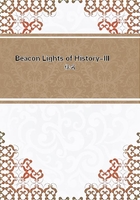
第19章
Whence this strange vitality? What are the elements of a power so enduring and so irresistible? What has given to it its greatness and its dignity? I confess I gaze upon it as a peasant surveys a king, as a boy contemplates a queen of beauty,--as something which may be talked about, yet removed beyond our influence, and no more affected by our praise or censure than is a procession of cardinals by the gaze of admiring spectators in Saint Peter's Church. Who can measure it, or analyze it, or comprehend it? The weapons of reason appear to fall impotent before its haughty dogmatism.
Genius cannot reconcile its inconsistencies. Serenely it sits, unmoved amid all the aggressions of human thought and all the triumphs of modern science. It is both lofty and degraded; simple, yet worldly wise; humble, yet scornful and proud; washing beggars'
feet, yet imposing commands on the potentates of earth; benignant, yet severe on all who rebel; here clothed in rags, and there revelling in palaces; supported by charities, yet feasting the princes of the earth; assuming the title of "servant of the servants of God," yet arrogating the highest seat among worldly dignitaries. Was there ever such a contradiction?--"glory in debasement, and debasement in glory,"--type of the misery and greatness of man? Was there ever such a mystery, so occult are its arts, so subtile its policy, so plausible its pretensions, so certain its shafts? How imposing the words of paternal benediction! How grand the liturgy brought down from ages of faith! How absorbed with beatific devotion appears to be the worshipper at its consecrated altars! How ravishing the music and the chants of grand ceremonials! How typical the churches and consecrated monuments of the passion of Christ! Everywhere you see the great emblem of our redemption,--on the loftiest pinnacle of the Mediaeval cathedral, on the dresses of the priests, over the gorgeous altars, in the ceremony of the Mass, in the baptismal rite, in the paintings of the side chapels; everywhere are rites and emblems betokening maceration, grief, sacrifice, penitence, the humiliation of humanity before the awful power of divine Omnipotence, whose personality and moral government no Catholic is tempted to deny.
And yet what crimes and abominations have not been committed in the name of the Church? If we go back and accept the history of the darker ages, what wars has not this Church encouraged, what discords has she not incited, what superstitions has she not indorsed, what pride has she not arrogated, what cruelties has she not inflicted, what countries has she not robbed, what hardships has she not imposed, what deceptions has she not used, what avenues of thought has she not guarded with a flaming sword, what truth has she not perverted, what goodness has she not mocked and persecuted?
Ah, interrogate the Albigenses, the Waldenses, the shades of Jerome of Prague, of Huss, of Savonarola, of Cranmer, of Coligny, of Galileo; interrogate the martyrs of the Thirty Years' War, and those who were slain by the dragonnades of Louis XIV., those who fell by the hand of Alva and Charles IX.; go to Smithfield, and Paris on Saint Bartholomew; think of gunpowder plots and inquisitions, and intrigues and tortures, all vigorously carried on under the cloak of Religion--barbarities worse than those of savages, inflicted at the command of the ministers of a gospel of love!
I am compelled to allude to these things; I do not dwell on them, since they were the result of the intolerance of human nature as much as the bigotry of the Church,--faults of an age, more than of a religion; although, whether exaggerated or not, more disgraceful than the persecutions of Christians by Roman emperors.
As for the supreme rulers of this contradictory Church, so benevolent and yet so cruel, so enlightened and yet so fanatical, so humble and yet so proud,--this institution of blended piety and fraud, equally renowned for saints, theologians, statesmen, drivellers, and fanatics; the joy and the reproach, the glory and the shame of earth,--there never were greater geniuses or greater fools: saints of almost preternatural sanctity, like the first Leo and Gregory, or hounds like Boniface VIII. or Alexander VI.; an array of scholars and dunces, ascetics and gluttons, men who adorned and men who scandalized their lofty position; and yet, on the whole, we are forced to admit, the most remarkable body of rulers any empire has known, since they were elevated by their peers, and generally for talents or services, at a period of life when character is formed and experience is matured. They were not greater than their Church or their age, like the Charlemagnes and Peters of secular history, but they were the picked men, the best representatives of their Church; ambitious, doubtless, and worldly, as great potentates generally are, but made so by the circumstances which controlled them. Who can wield irresponsible power and not become arrogant, and perhaps self-indulgent? It requires the almost superhuman virtue of a Marcus Aurelius or a Saint Louis to crucify the pride of rank and power. If the president of a college or of a railroad or of a bank becomes a different man to the eye of an early friend, what can be expected of those who are raised above public opinion, and have no fetters on their wills,--men who are regarded as infallible and feel themselves supreme!
But of all these three hundred or four hundred men who have swayed the destinies of Europe,--an uninterrupted line of pontiffs for fifteen hundred years or more, no one is so famous as Gregory VII.